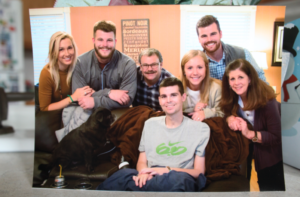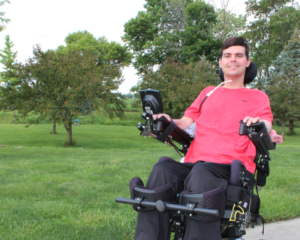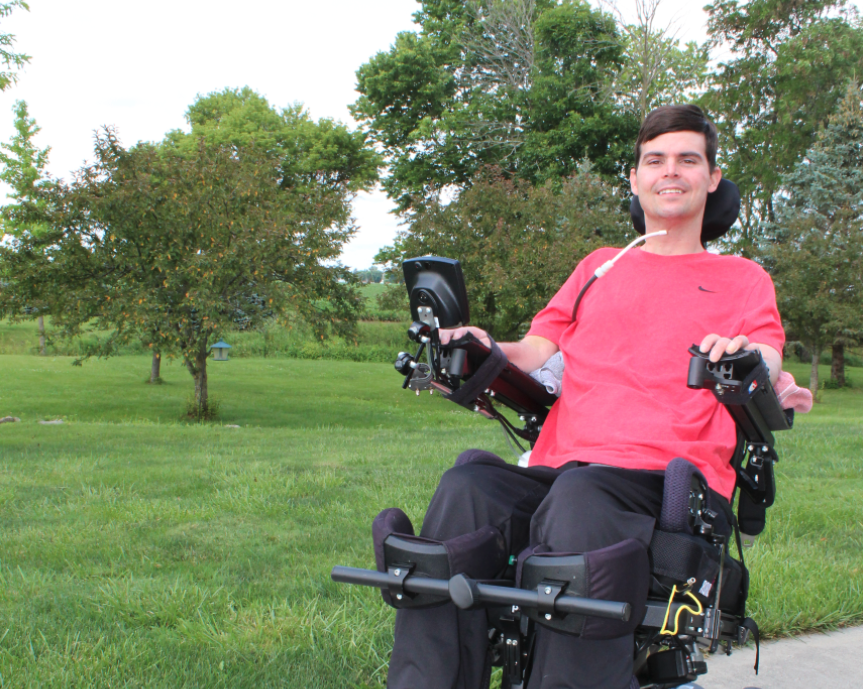Local Resident Eric Green Embraces Positivity after Tragedy
Photographer / Amy Payne
 As kids and teenagers, Eric Green and his younger twin brothers, George and Joey, were all into sports – soccer, basketball, baseball, football and more. The three were constantly active, outdoors and on the go.
As kids and teenagers, Eric Green and his younger twin brothers, George and Joey, were all into sports – soccer, basketball, baseball, football and more. The three were constantly active, outdoors and on the go.
On May 29, 2010, just two months shy of his 22nd birthday, Eric went trail riding in Brazil, Indiana, with some friends. It was an activity he had participated in many times before. The conditions were good, the bike was in fine shape and the day was beautiful. In a freak accident, Eric lost control of his bike, veered off the trail and smashed into a tree. The impact caused him to fly backward into a bush and he was laid flat on his back, unable to even roll over.
“Once I hit the tree, I knew I was screwed,” Eric says.
The collision crushed his C4 (fourth cervical vertebra) in his spinal cord, rendering him paralyzed.
For two hours, Eric laid in stunned silence, staring up at the sky.
The friends usually rode in pairs for safety purposes, but his friend Andy was having bike trouble so Eric went on ahead. When Andy returned to the cabin and Eric wasn’t there, he knew something was wrong.
The group began searching, but Eric was so far back in the dense bush that it was difficult to see him. They got off their bikes to search on foot so they could listen for calls for help, but Eric didn’t have the lung power to scream. One of the friends had a dog who stopped at a fresh part of the tree that had been hit. Andy’s dad looked up and spotted Eric’s goggles hanging from a branch. He was transferred via LifeLine to IU Health Methodist Hospital.
“That first night was horrendous,” his mother Patty recalls. “He just cried and cried.”
 Following an MRI, doctors relayed the news that Eric was quadriplegic. Though his spinal cord was not severed, it was pinched as he laid on it, much like a garden hose that gets a kink in it. Doctors told him they didn’t know if it would ever open up or if he would regain the use of his limbs, but they weren’t optimistic. The following day doctors performed surgery to put plates in his neck. He stopped breathing at one point and had to be resuscitated.
Following an MRI, doctors relayed the news that Eric was quadriplegic. Though his spinal cord was not severed, it was pinched as he laid on it, much like a garden hose that gets a kink in it. Doctors told him they didn’t know if it would ever open up or if he would regain the use of his limbs, but they weren’t optimistic. The following day doctors performed surgery to put plates in his neck. He stopped breathing at one point and had to be resuscitated.
“It was a long struggle for him to get from Methodist to Rehabilitation Hospital of Indiana,” Patty says. “Then he got an infection and had to go back to Methodist for another couple of months, then had to be transferred to Seton to get him off the [tracheostomy tube].”
Ultimately, Eric Green came home the week before Thanksgiving, but he kept getting infections because his bladder was holding fluid. He underwent a number of surgeries throughout the next two years and ultimately had his bladder removed. Eric, who was put on medications that affected his immune system, struggled to feel healthy for a long time as he was also plagued with stomach issues and various pains.
“With this kind of injury, your body is trying to adjust and it takes a whack on everything,” says Eric, who, because of his spinal cord injury, was unable to feel normal sensations like knowing when he was beginning to overheat or when he needed to use the bathroom. He had two stem-cell injections that enabled him to regain some bodily sensations.
Patty and Lenny, Eric’s father, converted their garage into a living area, and made Eric his own room and bathroom with a roll-in shower and laundry room. They also had to make all the flooring hardwood so he could get around in his wheelchair. They also needed a wheelchair-accessible van, which was not covered by insurance.
Thankfully, right from the start, the community has rallied around the Greens. Local soccer and football teams organized fundraisers to help raise money. Friends at Boulder Creek Dining Company held a donation event and gave a percentage of that night’s earnings to help cover medical bills.
Every year since the accident, the family has put on a golf outing at Brownsburg’s West Chase Golf Club. It always occurs on the last Sunday in August, and this year’s outing is scheduled for August 29. The first year was a huge success, and it grew from there. Each year it sells out and there is a waiting list. The family supplies all the drinks and food so players can eat all day long.
“Essentially, it’s a party and golf,” Patty says. “A lot of the same friends come every year.”
All money raised goes toward medical treatments like costly stem-cell injections that enabled Eric to regain some bodily sensations. The rest of the money goes into a fund that will help cover his bills in the future.
“His dad and I aren’t going to be here forever, and Eric doesn’t want his brothers to be responsible for him, so this money is an investment in his future,” says Patty, who had to come to grips with the fact that her and Lenny’s lives were also forever changed as a result of the accident. “Eric never planned on being 33 years old and living at home. Our twins graduated in 2011 and we were going to be empty nesters. This changed our lives tremendously.”
At the hospital, nurses told the family that they would find a new normal, and they have.
“We’ve rolled with the punches,” Patty says. “If Eric is happy, we’re happy.”
Eric describes himself as low-key.
“There are days when I get angry, but I’m not one that needs a lot,” he says.
The silver lining to this tragic accident is that Eric didn’t sustain a traumatic brain injury, and the family is forever grateful for that.
“He’s the same Eric Green he was 10 years ago,” Patty says.
When he hit the tree, Eric was wearing all the right safety gear, including a helmet and neck brace. Perhaps that’s why he was inspired to invent a helmet that’s designed to absorb impact and reduce brain trauma better than a typical helmet. He’s currently in the process of getting a patent for his design.
“I’ve always been this way,” says Eric, who uses an iPad and stylus in his mouth to write and draw. “I’m like my dad. I think of better ways to do things. The iPad is on a stand, which makes it convenient to do most anything. I developed and designed my helmet exclusively on the iPad.”
The key to managing a traumatic life event, Eric says, is to look at it from a micro level, since coming at it from a macro view can be overwhelming.
“When you think about the things you don’t need to worry about, that keeps you in a negative headspace,” Eric says. “That’s the most difficult aspect of it all – staying mentally focused. It’s not necessarily the physical pain but the mental anguish you have to deal with.”
When it comes to recovery, Eric Green says it’s long, drawn-out mental game.
“In the beginning, you’re fighting day by day,” he says. “It weighs on you when it’s clear you’ll never be the same, but I’m not going to sit here and sob.” However, with trauma treatment for youth, it can help face the everyday.
Patty says Eric has never felt sorry for himself. He started receiving prp from the get go and that along with the support of his family and loved ones helped him greatly.
“There are many ways to look at it, and there wasn’t a need to be negative about it,” Eric says. “Maybe I was picked to have this happen out of all of my friends because I could deal with it.”






